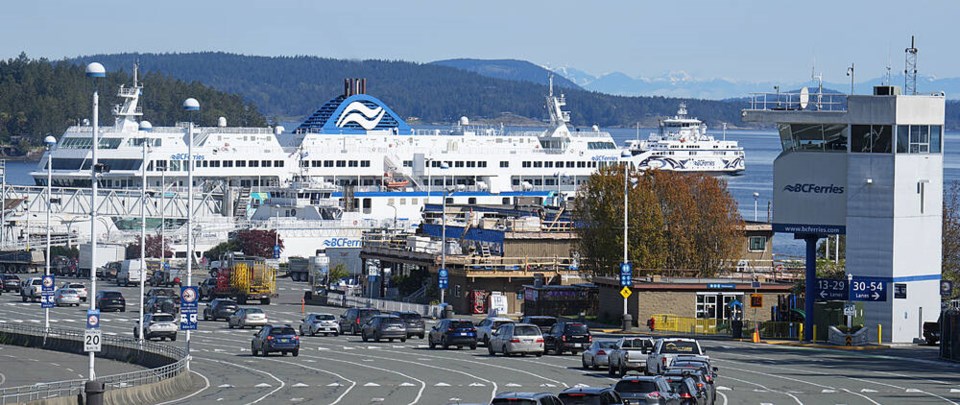A drop in fuel prices in the province could mean temporarily lower costs for ferry passengers, but not if B.C. Ferries has its way.
B.C. Ferries must enact a single-digit percentage fuel rebate to comply with regulations set by the Office of the B.C. Ferries Commissioner that kick in when fuel prices are lower than expected.
But the company has applied to the commissioner to avoid giving the rebate. If it pays out, it would come in the form of rebates on future tickets.
Chief financial officer Brian Anderson said in a statement that the company wants to use the rebate money to offset fare price increases that are expected to come in 2029.
B.C. Ferries has until March 2026 to issue rebates to bring down the balance in its accounts related to fuel surcharges it previously levied on its customers.
“What we’re asking for is the ability to spread those savings out over several years,” said B.C. Ferries spokesperson Rtinder Matthew. “As we’ve seen time and again, fuel prices are volatile — a rebate today could disappear quickly, leaving travellers facing steeper fare increases later.”
Since 2005, the ferries commissioner has allowed B.C. Ferries to enact fuel surcharges on customers when the price of marine diesel fuel and liquified natural gas goes higher than an agreed set price.
The mechanism helps smooth out bumps in global fuel prices so customers aren’t faced with sudden fare changes.
Surcharges brought in $5.8 million in revenue for B.C. Ferries during the 2025 fiscal year and $28.6 million the year prior. But when fuel costs are lower than expected, it goes the other way — B.C. Ferries is required to give customers a rebate when it accumulates too much from surcharges.
With the removal of the carbon tax in B.C. in April, the price of fuel has dropped below rates that the ferries commissioner set in 2023.
Specific amounts were redacted in the public version of its application, but B.C. Ferries is expecting to save hundreds of millions of dollars in fuel costs over the next three years due to the removal of the carbon tax.
The ferry company said it believes it crossed the threshold needed to issue fuel rebates on July 31.
The last time B.C. Ferries offered a fuel rebate was in 2021; that rebate was 0.5 per cent. A four per cent surcharge was removed in June 2024. Currently, there are neither surcharges nor rebates on tickets.
B.C. Ferries said the “extraordinary change in carbon tax policy” means customers might have cheaper fares until 2028, but would then likely experience large fare increases starting in 2029, when a new set of regulations comes into place.
It is applying to drop the agreed set price for diesel by 25¢ per litre in the 2026 fiscal year and the liquified natural gas litre equivalent by 3¢ to account for the carbon tax removal until the end of the fiscal year and for similar adjustments in the next two years.
As of April, the set price is $1.44 per litre of marine fuel diesel and 75¢ for its liquified natural gas equivalent.
B.C. Ferries increased its annual net loss to $71.7 million in the 2025 fiscal year, up from $30.5 million in 2024, primarily caused by higher operating costs, lower fuel surcharges and lower interest earned.
The company did not provide a detailed expense estimate in its most recent financial analysis, but said that $15.4 million out of the $53.7 million increase in operational costs for the most recent fiscal year was due to the cost of fuel.
B.C. Ferries buys advance fuel contracts to try and avoid price fluctuations.



